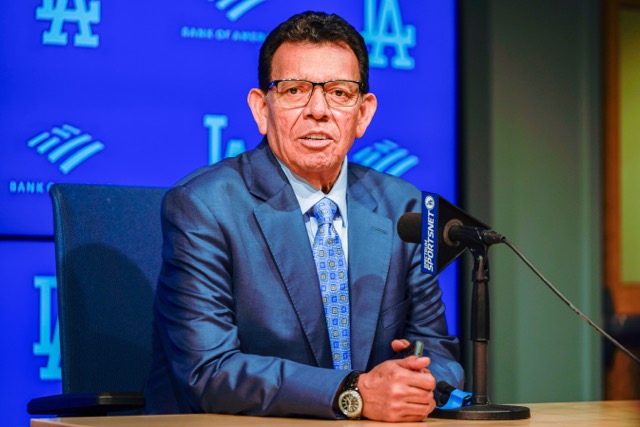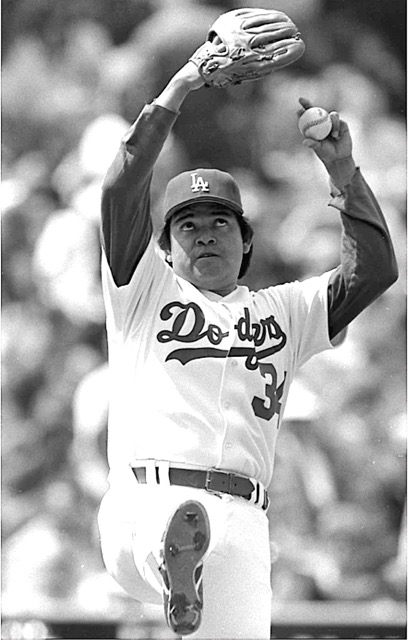Fernando Valenzuela
He turned the game into a religion.” ~ Hall of Fame broadcaster Jaime Jarrin
LOS ANGELES (CNS) – Legendary Los Angeles Dodgers pitcher Fernando Valenzuela, whose phenomenal start to the 1981 season ignited the “Fernandomania” craze and boosted interest in the game among Mexican-American fans in L.A. and elsewhere, died Tuesday at the age of 63, the team announced.
“On behalf of the Dodger organization, we profoundly mourn the passing of Fernando,” team President and CEO Stan Kasten said. “He is one of the most influential Dodgers ever and belongs on the Mount Rushmore of franchise heroes.”
No cause of death was given, but the Dodgers announced earlier this month that Valenzuela, part of the Dodgers’ Spanish-language broadcast team, would sit out the rest of the season due to an unspecified health problem.
Various media reports had surfaced earlier indicating that Valenzuela left the broadcast booth Sept. 24 during the Dodgers series with the San Diego Padres and was hospitalized, although no reason was provided.
Commissioner Rob Manfred said that MLB would “honor Fernando’s memory during the 2024 World Series at Dodger Stadium,” which begins tonight.
“Fernando Valenzuela was one of the most impactful players of his generation,” Manfred said in a statement. “With his distinctive pitching style, the Dodgers left-hander’s rookie season generated so much excitement in the U.S. and his native Mexico that it became commonly referred to as `Fernandomania.’ His 1981 season ranks among the most decorated pitching years of all-time as Fernando was the National League Rookie of the Year, the NL Cy Young Award winner, a Silver Slugger and a World Series champion.
“Following his memorable career, Fernando was an outstanding ambassador for baseball. He consistently supported the growth of the game through the World Baseball Classic and at MLB events across his home country. As a member of the Dodger broadcasting team for more than 20 years, Fernando helped to reach a new generation of fans and cultivate their love of the game. Fernando will always remain a beloved figure in Dodger history and a special source of pride for the millions of Latino fans he inspired.”

Kasten said Valenzuela “galvanized the fan base with the Fernandomania season of 1981 and has remained close to our hearts ever since, not only as a player but also as a broadcaster. He has left us all too soon. Our deepest condolences go out to his wife Linda and his family.”
Born in Navojoa, Mexico, Valenzuela was the youngest of 12 children. The Dodgers purchased Valenzuela’s contract from Leones de Yucatan of the Mexican League on July 6, 1979, and assigned him to their Class-A California League affiliate in Lodi.
Valenzuela was taught to throw his famed screwball by Dodgers pitcher Bobby Castillo following the 1979 season. Armed with the new pitch, Valenzuela led the Texas League in strikeouts in 1980.
Valenzuela made his Major League debut at age 19 with the Dodgers on Sept. 15, 1980, throwing 17.2 innings without allowing an earned run for the remainder of the season.
When Jerry Reuss pulled a leg muscle 24 hours before his scheduled opening day start in 1981 and Burt Hooton wasn’t ready to fill in, Valenzuela became the Dodgers opening day starter, pitching a five-hit shutout in a 2-0 victory over the defending National League West champion Houston Astros.
He then went on an unprecedented career-opening run, with complete games in his first eight career starts — five of them shutouts — and a 0.50 ERA. Immediately, Fernandomania became a fan sensation.
“He turned the game into a religion,” Hall of Fame broadcaster Jaime Jarrin once said.
Valenzuela became the only player to win the Cy Young Award and the Rookie of the Year Award in the same season. He drew thousands of Mexican- American fans to Dodger Stadium and stadiums throughout the country.
The Dodgers won the World Series over the New York Yankees in six games in 1981, with Valenzuela winning Game 3 at Dodger Stadium after L.A. had lost the first two games in New York. Valenzuela was also on the Dodgers team that won the World Series in 1988 over the Oakland A’s.
He finished his career with a 173-153 record and a 3.54 ERA. He pitched in 453 games and made 424 starts.
Valenzuela could even do damage with his bat, too, hitting 10 home runs in his MLB career.
After leaving the Dodgers following the 1990 season, he pitched for the California Angels, Baltimore Orioles, Philadelphia Phillies, San Diego Padres and St. Louis Cardinals.
His No. 34 is one of 12 retired by the Dodgers, when he was celebrated during a three-day “Fernandomania” weekend in August 2023.
“He created more baseball fans, and Dodger fans, than any other player,” Jarrín, who called Dodger games from 1959-2022, said before the ceremony. “Thanks to this kid, people fell in love with baseball, especially within the Mexican community.”
In his Cy Young Award season of 1981, Valenzuela led the National League in strikeouts, shutouts, complete games, innings pitched and starts.
He led the National League in wins in 1986 and had a 21-11 record with a 3.14 ERA. He also led the league in complete games and had three shutouts.
He threw a no-hitter against the St. Louis Cardinals on June 29, 1990, the same day Dave Stewart of the Oakland A’s threw a no-hitter against the Toronto Blue Jays.
It was the only no-hitter of Valenzuela’s career. The Dodgers won the game, 6-0, and Valenzuela struck out seven, walked three and threw 119 pitches. The game ended with one of the late Dodgers broadcaster Vin Scully’s more memorable calls, “If you have a sombrero, throw it to the sky.”
Valenzuela, a six-time All Star, went 141-116 with a 3.31 ERA with the Dodgers. He retired from baseball in 1997 and spent 21 seasons as a Spanish- language broadcaster, teamed most recently with Pepe Yniguez and Jose Mota for the Dodgers.
Fans loved Fernando for his accomplishments, but also for his everyman physique and down-to-earth manner.
His uncommon modesty was on display in a series of interviews with MLB.com in 2021 marking the 40th anniversary of Fernandomania, when he was asked how he wanted to be remembered.
“It would be really great if they remembered me as someone who always tried his best to always give them a good show, so that they could have fun with this beautiful game,” he said.
Valenzuela is survived by his wife Linda and four children, Fernando Jr., Ricardo, Linda and Maria Fernanda, and seven grandchildren.
For More Sports News Visit www.zapinin.com/sports


